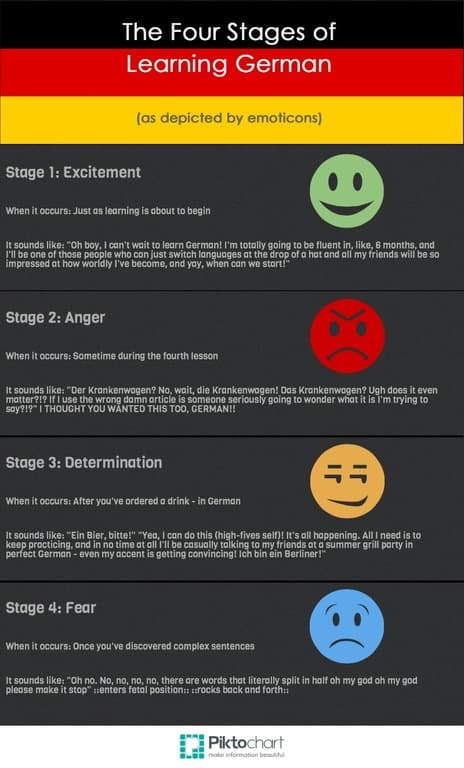

Помните, когда вы были в средней школе. И вам нужно было научиться писать эссе из пяти абзацев?
Потому что теперь пришло время научиться делать все это по-немецки.
Хотя эссе на многих иностранных языках структурированы иначе. Чем на английском. Немецкие эссе на самом деле очень похожи на их английские эквиваленты.
И важно научиться писать и структурировать аргументацию на немецком языке. Если вы планируете когда-

нибудь учиться там, или даже если вы просто заинтересованы в посещении занятий в школе с немецким языком обучения.
Так что читайте дальше. Чтобы узнать все. Что вам нужно знать о написании эссе на немецком.
Содержание
Скачать: Это сообщение в блоге доступно в виде удобного и портативного PDF-файла. Который вы можете взять с собой куда угодно. Нажмите здесь. Чтобы получить копию. (Скачать)
На что похожи немецкие эссе?
-
Они структурированы аналогично английским эссе. Помните, выше я упоминал английское эссе из пяти абзацев с началом. Серединой и концом?

Хорошие новости: немецкие эссе содержат те же части. Когда вы пишете эссе на немецком языке. Вам нужно включить вступительный абзац с вашими аргументами. Три вспомогательных абзаца. Которые дополняют ваши аргументы. И заключение. Немецкий и английский часто удивительно похожи, и структура эссе не является исключением.
-
Немецкие эссе более актуальны. Хотя немецкие эссе и английские эссе структурированы аналогично. Немецкие эссе — как и носители немецкого языка — имеют тенденцию быть более прямыми и точными. Вам не нужно будет ходить вокруг да около своих выводов или запутываться на немецком: просто скажите. Что вы имеете в виду.

- Немецкая пунктуация отличается. У немцев другие правила пунктуации. Чем у англоговорящих. Например, немцы вводят прямую кавычку с двоеточием вместо запятой. Они используют кавычки вместо курсива для названий книг. Фильмов и газет. И они выделяют относительные предложения. Начинающиеся с dass (that), запятой. В отличие от американского английского. Понимание этих различий между английской и немецкой пунктуацией гарантирует. Что вы не выдадите себя за неродного носителя языка одними знаками препинания!
4 Успешные стратегии написания эссе на немецком языке

Вы готовы начать писать? Используйте эти четыре стратегии. Чтобы удивить своих учителей и написать идеальное эссе на немецком языке.
1. Напишите список слов. Которые вы хотите включить.
Когда вы будете готовиться к написанию эссе. Обязательно составьте список слов. Которые вы хотите включить.
Вы должны смотреть на любое новое занятие как на возможность выучить и освоить новую лексику. Вместо того. Чтобы использовать те же слова. Которые вы используете в повседневной немецкой речи. Используйте это эссе как возможность ввести новые слова в свой немецкий лексикон.

Кроме того, включение академических слов. Которые помогут вам сформулировать и сформулировать свои аргументы. Может сделать ваше эссе более профессиональным и отточенным.
Вот несколько примеров слов. Которые могут помочь вам сформулировать и сформулировать ваши аргументы:
- Beispiel (пример)
- Zweck (цель, цель)
- einerseits (on the one hand)
- Am Anfang (at the beginning)
- schließlich (in conclusion)
Find more good words to use in your essay here.
2. Do your research.
After you’ve chosen your words for the essay. It’s important to spend some time doing research on your essay topic.
As with everything else. You should look at the research portion of the essay-writing process as an opportunity to learn more about Germany—this time. About German culture, history, politics or travel. Chances are if you’re writing your essay for a language-learning class. You’ll be assigned a topic pertaining to one of these aspects of German life. So use this as a chance to learn more about Deutschland.
Deutsche Welle offers information and resources about German history. While news magazine Der Spiegel offers a look at German culture and politics. And other newspapers such as Berliner Zeitung and Frankfurter Allgemeine Zeitung offer another perspective on politics and daily life in Germany.
3. Make an outline using transition words.
After you’ve completed your research. Make an outline of your major points. Making sure to incorporate transition words.
There’s nothing clunkier than an essay that doesn’t flow naturally from one point to the next. Besides, thinking about how your arguments and points interact with each other will help you organize your essay and make sure you get your point across. (Do they support each other? Counter each other? How exactly do they function to further your argument?)
Examples of transition words:
- Vorher (prior)
- zur gleichen Zeit (at the same time)
- dann (then)
- trotzdem (nevertheless)
- noch (still)
4. Don’t write it in English and then translate into German.
When you’re writing your essay. Make sure you avoid the oh-so-tempting practice of writing it in your native language and then translating it into German.
This is a bad idea on several levels. Writing an essay in English and then translating it into German often results in stilted. Poorly formed sentences and unnatural constructions. For example. Remember that German word order is different from English. If you write “He didn’t read the book,” a one-to-one literal translation would be Er hat gelesen nicht das Buch. But the correct translation is actually Er hat nicht das Buch gelesen. In this example. Translating word for word leads to errors.
There’s another. Less tangible reason why it’s not a good idea to write in English and translate to German. Sure, in the example above. You could just remember that you need to change the word order when translating into German. But isn’t it better to adapt your brain so that German word order seems fluid and natural? Learning to think and write off-the-cuff in German is an essential step towards fluency. And devising sentences in German. Instead of sentences in translation, will help you learn to do that.
One good way to learn to think in a language is to hear it spoken in natural contexts. You can hear German spoken naturally in German language TV shows, movies and videos. FluentU is a language learning program that uses clips from native German media to teach you the language as native speakers use it.
FluentU uses interactive captions to help you follow along with videos using either German or English translations. Reading along with dialog in German is a good way to solidify the connection in your mind between words and their in-context meanings
Listening to German spoken at a natural speed and native accent will help get you thinking in the language in real time. This will help get you to the point where you can come up with your own sentences in German. Rather than thinking in English sentences first and then translating them in your head before you speak or write. That will greatly improve your speed and fluency when writing in German.
So, simply start writing the essay in German. Look up any words you’re not sure of and double-check any grammatical constructions that you’re not familiar with. After you finish writing, ask a German-speaking friend to look over the essay to make sure it sounds natural.
An Example of a German Essay
Now that we’ve explored four strategies for writing top-notch German essays. Let’s take a look at an example. A popular topic in Europe right now is World War I. Since the war was taking place a hundred years ago. World War I doesn’t get very much play in the States. But for Europe. World War I was a devastating example of the dangers of modern technological warfare and the horrors of violence.
Let’s take a look at an example opening paragraph and outline of an essay about the effect of World War I on German government and life.
Opening paragraph:
Der Erste Weltkrieg war ein totaler Krieg. Der Deutschland völlig veränderte. Dieser Krieg hat 1914 angefangen, und 1918, als der Krieg zu Ende kam. Waren die deutsche Gesellschaft. Regierung und Kultur nicht mehr erkennbar. Am Anfang hat der Erste Weltkrieg altväterliche Ideen und Systeme verstärkt. Am Ende hat dieser Krieg dagegen diese altväterlichen Dinge zerstört.
(The First World War was a total war that completely changed Germany. This war began in 1914 and in 1918, when the war came to an end. German society. Government and culture were no longer recognizable. At the beginning. The First World War strengthened old-fashioned ideas and systems. However by the end. This war destroyed these old-fashioned things.)
Notice that this opening paragraph is not very different at all from the first paragraph of an English essay. You can use the same structure you’ve always used to write your German essay. Leaving you free to focus on grammar and vocabulary. Notice also the use of phrases such as Am Anfang (at the beginning) and Dagegen (however). Words like these can help you make a point and counterpoint in your opening paragraph (or anywhere in your essay. For that matter).
Outline:
I. Am Anfang (at the beginning):
– Dieser Krieg hat Deutschland vereint. (This war united Germany)
– Menschen hatten ein patriotisches Gefühle. (People had a patriotic feeling)
– Menschen dachten. Dass der Krieg bald zu Ende kommen würde. (People thought that the war would soon come to an end).
Notice that these points employ words like dachten (thought). Written German often relies on Präteritum, a form of the past tense that’s rarely used in spoken Deutsch. It’s often called “literary past tense” for this reason. Check out this guide to the Präteritum to include this tense in your essay.
II. Andrerseits (on the other hand):
– Bald gab es kein mehr Essen. (Soon there was no more food)
– Menschen wurden krank und desillusioniert. (People became sick and disillusioned)
– Es gab Proteste und Unruhen (There was protest and unrest).
Like in an English essay. Your second and third paragraphs can include supporting points or counterpoints that contribute to the overall theme of your piece. The word Andrerseits (on the other hand) is an ideal transition word to show that you’re moving into another section of your essay.
Also notice that this essay will rely on vocabulary words that the average language learner might not have come across in his or her learning. After all, who learns the words for “disillusioned” and “unrest” in their intermediate German class? But don’t be daunted by the fact that your essay might include eclectic vocabulary. Instead, use this as an opportunity for more learning.
III. zum Schluss (in conclusion):
– Der Kaiser hat abgedankt. (The Emperor abdicated)
– Eine Republik wurde geboren (A Republic was born)
– Die alten Werte waren weg. (The old values were gone)
Once again, abgedankt (abdicated) is an example of the literary past tense (and an example of a word that you probably haven’t come across in your previous German studies!)
IV. Schließlich (finally)
– Der Erste Weltkrieg hat Deutschland verändert. (the First World War completely changed Germany)
Again, like in an English essay. You should use this paragraph to summarize your main point.
Writing an essay in a foreign language might seem like a daunting task. But follow these four strategies and you’ll be well on your way to arguing your point auf Deutsch.
Download: This blog post is available as a convenient and portable PDF that you can take anywhere. Click here to get a copy. (Download)



